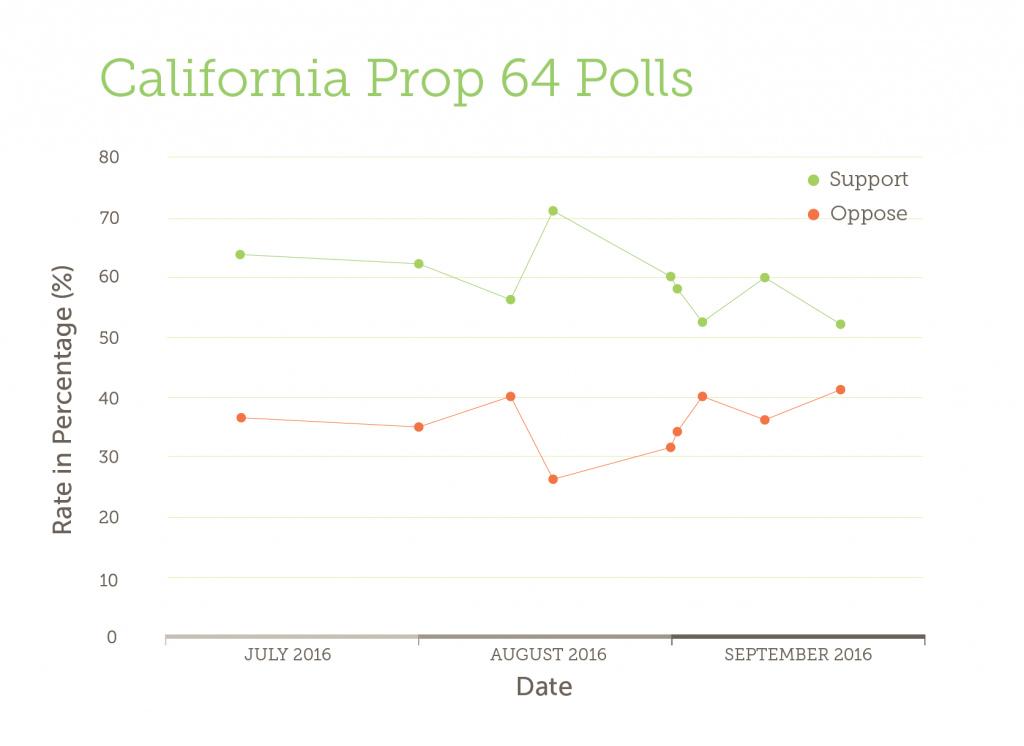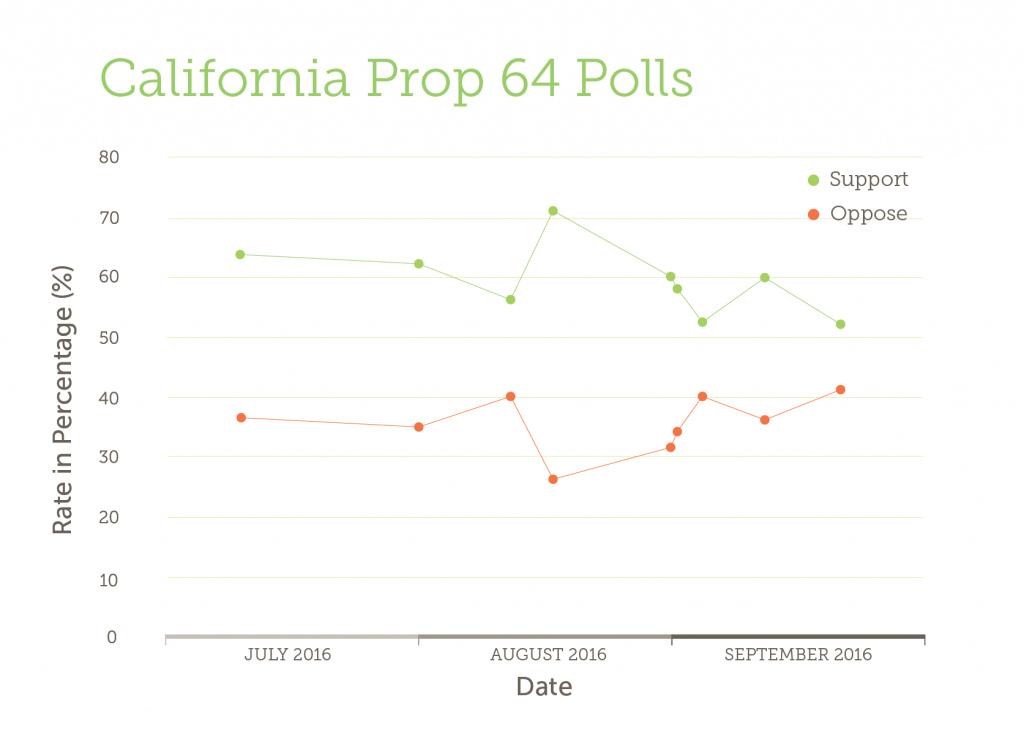For the second time in California history, voters will be facing an initiative that would legalize the recreational use of marijuana and hemp for adults over 21. As opposed to a similar measure, Proposition 19, which lost in 2010, this one appears to have a good chance of passing.
According to the latest Field Poll/Institute of Governmental Studies at University of California, Berkeley survey, six out of 10 likely voters say they will vote yes on Proposition 64 to legalize marijuana for recreational purposes.
Proposition 64 would create two ways to tax marijuana. One calls for a 15 percent tax on the retail price of cannabis, while the other would be a cultivation tax of $9.25 per ounce of flowers, and $2.75 per ounce for leaves. The purpose of these taxes is to help cover the costs of administering and enforcing Proposition 64. Local government agencies have the ability to assess additional taxes.
Proponents say the measure is worded such that the majority of the state tax revenue would be distributed to drug research, treatment and enforcement. In addition, 60 percent of the remaining revenue will be used for youth programs, including drug education, prevention and treatment. Twenty percent would go to prevent and alleviate environmental damage from illegal marijuana producers. The other 20 percent would be used for programs designed to reduce driving under the influence of marijuana and to support a grant program designed to reduce negative impacts on health or safety resulting from the proposition.
By and large, students at Sonoma State University say they are supportive of the legalization attempt because of the health benefits marijuana provides. Furthermore, students who support Proposition 64 perceive marijuana to be safer than most over the counter medicines. On the other hand, some of those who are against proposition 64 believe marijuana is a gateway drug and it can still lead up to using other hardcore drugs, or eventually develop an addiction. In addition, those against Proposition 64 worry that people will begin to drive under the influence because there is no blood-alcohol-like test for marijuana. “Throughout my entire high school years, I suffered a lot of anxiety and pressure to get into a UC. Once I made the decision to settle for Sonoma State University, I thought the work load would get easier, but it didn’t,” said Emilio Oliveros, a Sonoma State student who got his legal medical marijuana card during his freshman year of college. “I found myself experiencing more anxiety to keep a 4.0 GPA, so I went to therapy to find a way to cope with it. Rather than taking six prescription pills, I asked if marijuana could be another solution. Once I started, it definitely changed my perception on my life in a positive way and continues to offer a different perspective outside the box we live in.”
As opposed to previous generations, the millennials have much more information about the long-term effects of marijuana, which makes the topic easier to approach.
“As a millennial, we grew up in an era where marijuana was and still is used as a substitute for over the counter medicine or recreational use,” said Kevin Valencia, a Sonoma State student who does not have a medicinal marijuana card. “Before our generation, marijuana was taboo because we did not fully understand the effects and long term symptoms it causes. Now that we do, public figures are more open about it because our generation perceives it as medicine rather than a harmful drug.”
For Sonoma State students, Proposition 64 would not have an impact on campus housing. Director of Campus Housing Nicole Hendry said the campus will not only remain a smoke-free campus, but students who receive funds from the federal government such as financial aid and research grants requires the university to comply with the federal laws. Even though California may legalize marijuana, the federal government still considers it illegal.
Studies on drug policy state black and Latino communities are disproportionately targeted, incarcerated and damaged by discriminatory enforcement of marijuana laws. As a result, by voting yes on Proposition 64, this unregulated market would be protected under the rule of law. Furthermore, it would reduce and eliminate criminal penalties for marijuana offenses and overall reduce the harmful impact in discriminatory criminalization.
According to the California Growers Association, in 2014 there were 13,300 felony arrests and 6,411 misdemeanor arrests for cannabis. In 2008, there were 17, 126 felony arrests and 61,388 misdemeanor arrests for cannabis.
“There have been concerns expressed that the economic impacts of Proposition 64 will actually increase crime in communities where cannabis is prevalent. There is significant evidence that socio-economic conditions are related to crime,” according to the California Growers Association’s website citing concerns with the proposition. “Simply put: less jobs lead to more crimes. Consolidating the cannabis industry will result in catastrophic economic collapse for huge swaths of California and the impacts will be especially acute in communities where cannabis is prevalent.”
On the other hand, the Drug Policy Action Campaign supports Proposition 64. because small growers will be able to start up their businesses, thanks to the delay in cultivation license done by the Adult Use of Marijuana Act 2016. As a result, small growers will have the opportunity to establish themselves in the market and Proposition 64 restricts large producers from integrating with each other by forming a monopoly.
Furthermore, the Drug Policy Action Campaign believes this will lower crime by offering people an opportunity to start a growing business and Proposition 64 will help alleviate the overburdened criminal justice system from petty marijuana possessions.





![[Both photos courtesy of sonoma.edu]
Ming-Ting Mike Lee stepped in as the new SSU president following Sakakis resignation in July 2022](https://sonomastatestar.com/wp-content/uploads/2024/04/CC4520AB-22A7-41B2-9F6F-2A2D5F76A28C-1200x1200.jpeg)



























